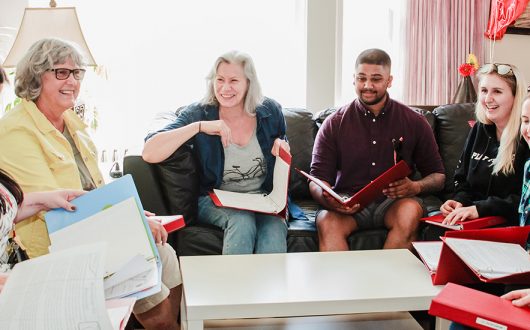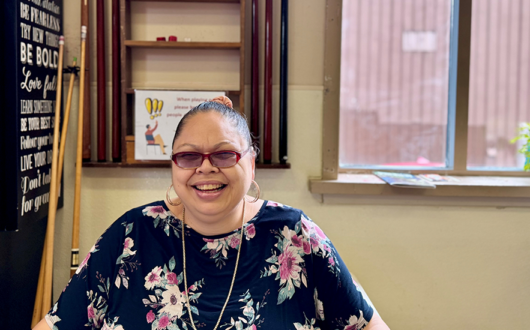On the forefront of solutions: Coast Mental Health’s role in battling the opioid crisis
Based on first appearances, Phil had it all: a graduate degree; a job with the federal public service; and a fiancée. But below the surface, Phil was falling apart.
In his late twenties he was diagnosed with schizophrenia. His relationship broke down. To cope with stress, he turned to drugs and alcohol.
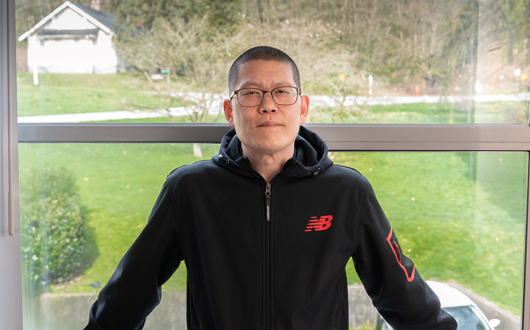
Phil is a graduate of the Rehabilitation and Recovery substance use treatment program operated by Coast Mental Health.
More than 80% of people with a substance use disorder also have co-occurring mental illness
“My mental health and addiction problems overwhelmed me,” remembered Phil. “I made some half-hearted attempts at recovery and spent two decades in and out of institutions. It wasn’t until my dad died in 2019 that I became serious about recovery. I attended the Burnaby Centre for Mental Health & Addiction, and from there I was able to access Coast’s R&R program in October 2020.”
Coast Mental Health’s Rehabilitation and Recovery Program works with people who have concurrent mental health and addiction concerns. It is a vital part of addressing B.C.’s growing opioid crisis.
Within the 40-bed centre, clients receive ongoing treatment as well as begin reintegrating with the community. As they progress through the program and approach discharge, staff ensure that supportive housing and access to mental health care are in place for them.
Coast has been on the forefront of offering such services for people with concurrent disorders.
“It’s been a growing concern,” said CEO Darrell Burnham. “Early on, it was dirty needles and harm reduction. But that changed dramatically when fentanyl landed. Because we’re on the ground level, we have to recognize and react to emerging situations quickly. We’ve had to build capacity and train staff. We’ve built supervised use rooms at several sites and now offer housing for people who have experienced homelessness, and sadly many individuals in this situation require complex care supports.”
Responding to a crisis
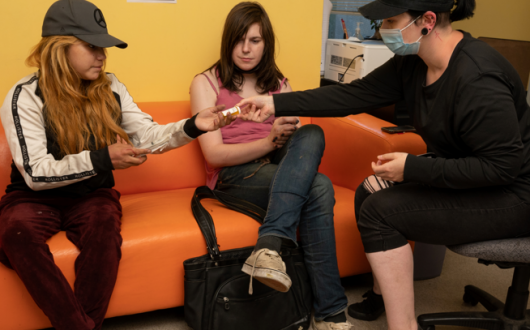
The Young Adult Opioid Agonist Therapy pilot program provided evidence–based data that in-house supports reduce relapses and save lives.
The toxic drug supply in B.C. has been challenging for clients in our care, many of whom also struggle with substance use disorders. While we’ve taken steps to provide harm reduction supports to keep people safe, fatalities are still occurring at high numbers. For this reason, we will continue to advocate for harm reduction supports and services to assist people living with substance use disorders. To learn more about our advocacy efforts visit our Yes, In My backyard campaign.
With B.C.’s toxic drug supply and the risk of overdoses within B.C. communities, Coast Mental Health had to implement supports quickly to keep people in its care safe.
Coast was one of the partners in the Vancouver Best Practices in Oral Opioid Agonist Therapy (BOOST) collaboration, which was launched in partnership with the BC Centre for Excellence in HIV/AIDS and Vancouver Coastal Health. In 2017, 20 healthcare teams across Vancouver joined forces with a goal of improving care for clients living with opioid use dependency.
From this initiative came the Young Adult Opioid Agonist Therapy (OAT) pilot program, which was piloted through a partnership between Coast Mental Health and the Vancouver Foundry. The clinic provided treatments that include Suboxone and methadone to treat opioid dependency, reduce drug-related harms, and support long-term recovery.
Read the Vancouver Sun (Nov 2021) editorial: Dan Fumano: ‘The trend is bad’: Mental health agency lobbies for overhaul of B.C. System.
Coast recently joined forces with Dr. Bill MacEwan, the former head of psychiatry at St. Paul’s Hospital and a clinical professor in the Department of Psychiatry at UBC, to offer a one-day-a-week clinic for residents living in our Maple Ridge sites. Clients receive an immediate connection to the supports they desperately need, and Dr. MacEwan has knowledge of the needs and processes to help them manage their mental health.
“The tenants have varying levels of need. Some are very ill and have experienced huge trauma and led chaotic lives. Coast staff were ready to embrace the idea that they needed a bit of help and that I could offer a bit of help,” said Dr.MacEwan.
Practical research drives changes in the healthcare system
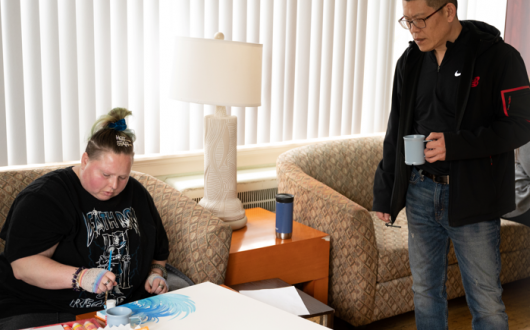
Today, Phil presents a workshop at the Rehabilitation and Recovery Program to support people living with schizophrenia.
As part of our 50th Anniversary, we thank the many people, groups and organizations that support us. This includes the many ongoing academic research collaborations, client and family consultations, community partnerships, committees and advisory groups we engage with. It’s with your support that we’re able to respond quickly to emerging issues that impact the mental health community.
The success of OAT programs and onsite clinical supports encouraged Coast Mental Health to apply for a Health Canada grant to offer virtual care to prevent more overdoses and encourage recovery. Dr. Fiona Choi, a clinical researcher in the Department of Psychiatry at UBC was one of the grant writers.
“Coast sees the need to bridge gaps between different services and improve communication between those providers,” said Dr. Choi. “These are innovative advances to the current system. This virtual integration of care will serve as a wraparound service for clients and bring mental health, addictions, and counselling professionals together in a common space. The platform will connect records so there will be shared knowledge of the treatment tenants require and receive.”
Coast continues to work with academic researchers, community partners and clients to develop evidence-based research that will better support people with substance use dependence.
“The services [Coast Mental Health] offers, and through our many partnerships, help stabilize people who were previously not getting treatment for their mental health issues,” added Darrell. “Their primary, mental and physical health are improving because they have access to these programs.”
That’s certainly true for Phil. He is now living in supportive housing and looking forward to furthering his education and rejoining the workforce. He participates in community-based mental health programs, co-facilitates R&R programs, and volunteers with various government committees to provide lived experience insights.
“Coast helped me get my life back on track,” he said. “I’d like others to know there’s always hope. There are a lot of people who care.”
Celebrating 50 years in 2022
Coast Mental Health celebrates 50 years of building essential community-based services across Greater Vancouver. Visit our site to see “The Difference” we’re making in your neighbourhood.

